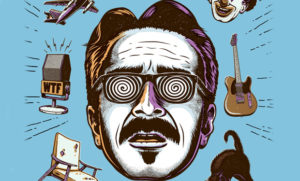
WTF with Marc Maron is not only a pioneer in the podcasting world but also exists as a cultural indicator. It shows a desire on the part of consumers to hear content that reveals something deeper about the artists/comedians/celebrities that produce it.
WTF gets hundreds of thousands of downloads per episode, and has had over 100,000,000 downloads overall. Maron has interviewed hundreds of guest. Artists, musicians, comedians. He even interviewed President Obama. His podcast has a scope that is not typical of others. While there may be a seemingly endless amount of podcasts to choose from, there is something about Maron’s that makes it unique, and successful.
Maron’s podcast defines him now. He is sort of pigeon-holed by it, not by others, but by himself. In his semi-autobiographical IFC show Maron it defines the opening credits, and a structural component of every episode is that he interviews a guest and manages to relate it back to the overall story of the episode. In his book Attempting Normal he opens the book by discussing the podcast and integrates transcripts from special episodes of the podcast between different chapters.
His description of the podcast is incredibly telling of why his podcast has resonated.
“I started asking people to come over and talk to me amid the clutter of my life. People came, hundreds now. The podcast evolved into a one-on-one interview show. I shared many powerful conversations revealing things about the people I was talking to and about myself that I would have never known. Things that will never be said the same way again. It happened organically. I needed to talk and people talked to me….Hundreds of thousands of people have joined in on these conversations as listeners, which has affirmed on of the strange beliefs that has shaped my life: People want to share but they usually don’t.
People don’t talk to each other about real things because they’re afraid of how they’ll be judged. Or they think other people don’t have the capacity to carry the burden of what they have to say. They see the compulsion to put that burden out in the world as a show of weakness. But all that stuff is what makes us human, more than that, it’s what makes being human interesting and funny. How we got away from that, I don’t know. But fuck that. We’re built to deal with shit. We’re built to deal with death, disease, failure, struggle, heartbreak, problems. It’s what separates us from the animals and why we envy and love animals so much. We’re aware of it all and have to process it. The way we handle being human is where all the good stories, jokes, art, wisdom, revelations, ad bullshit come from.”


